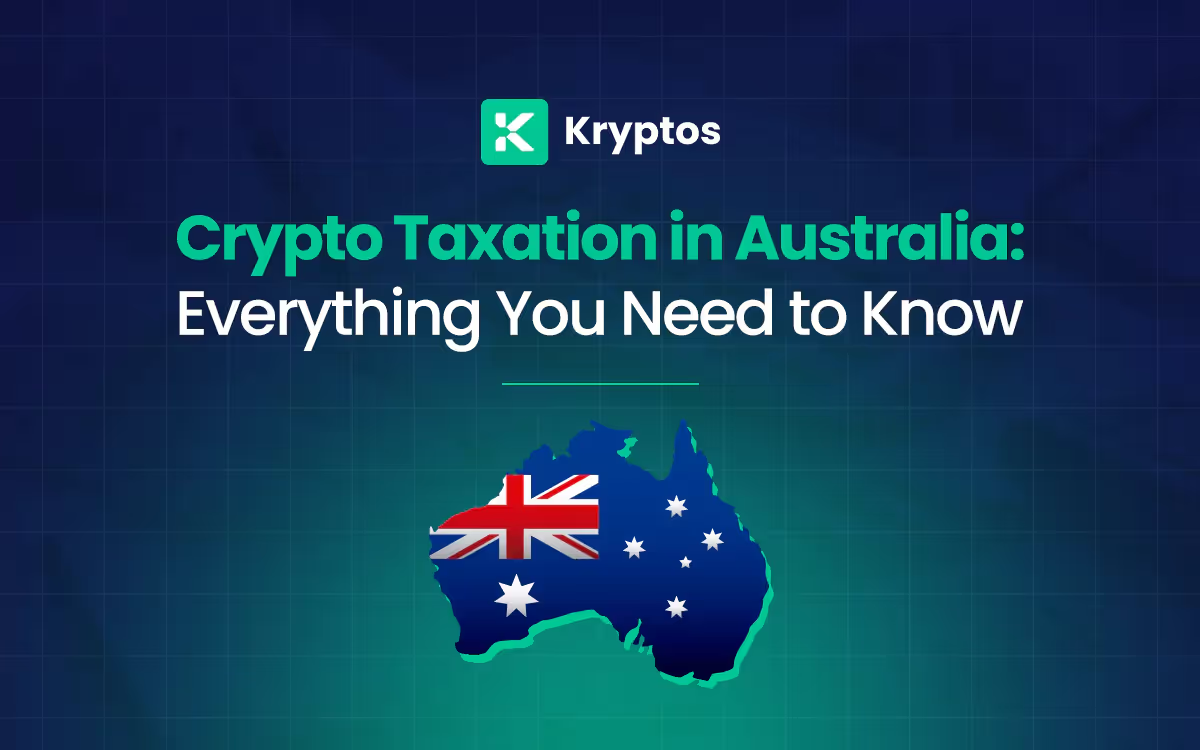.avif)
Calculate Your Crypto
Taxes in Minutes

Introduction:
As cryptocurrency adoption continues to grow, so does the complexity of its taxation. In Australia, the Australian Taxation Office (ATO) has laid out specific guidelines for crypto tax compliance. This blog will provide an overview of the current rules, recent updates, and how Kryptos can simplify the process for you.
Current Rules and Regulations:
The ATO treats cryptocurrency as property, meaning it is subject to capital gains tax (CGT). Whether you’re selling, trading, or using crypto to purchase goods and services, these transactions are taxable. Additionally, if you receive crypto as a form of payment or through mining activities, it is considered income and must be reported.
Key Points:
1. Capital Gains Tax (CGT):
- Disposal Events: Selling, trading, or using crypto to purchase goods/services triggers a CGT event.
- Calculation: The capital gain is the difference between the sale price and the purchase price, adjusted for any acquisition costs.
- Record Keeping: Accurate records of all transactions, including dates, values, and purposes, must be maintained.
2. Income Tax:
- Payment and Mining: Crypto received as payment or through mining activities is considered income and must be reported at its fair market value on the date of receipt.
- Staking Rewards: Rewards earned through staking are also treated as income and must be reported.
3. Personal Use Asset:
- If cryptocurrency is used to purchase items for personal use and enjoyment, and the cost is less than AUD 10,000, it may be considered a personal use asset and exempt from CGT.
Recent Updates:
Recently, the ATO has increased its focus on ensuring crypto compliance. They’ve introduced new guidelines and tools to help taxpayers report their crypto transactions accurately. Staying updated with these changes is crucial to avoid penalties and ensure compliance.
1. Enhanced Data Matching Programs:
The ATO has enhanced its data matching capabilities, partnering with cryptocurrency exchanges to ensure accurate reporting. This allows the ATO to cross-check information provided by taxpayers against exchange data.
2. Crypto-Specific Guidance:
The ATO has published detailed guides on various aspects of crypto taxation, including staking, DeFi activities, and airdrops, providing clarity on how these should be reported.
3. Focus on DeFi and NFTs:
The rise of Decentralised Finance (DeFi) and Non-Fungible Tokens (NFTs) has led to new tax implications. The ATO is developing specific guidelines to address these areas, ensuring that taxpayers understand their obligations.
4. Increased Penalties:
To deter non-compliance, the ATO has increased penalties for failing to report crypto transactions accurately. This includes significant fines and potential legal action for serious breaches.
Use Case:
Imagine an investor who bought Bitcoin a few years ago and decided to sell it in 2024. Calculating the capital gain involves determining the difference between the sale price and the purchase price, adjusting for any costs associated with acquiring the Bitcoin. This process can be complex and time-consuming.
Kryptos Solution:
Kryptos simplifies this by automatically tracking all your crypto transactions and calculating the necessary taxes. Our platform integrates with over 5000 exchanges and wallets, providing a comprehensive and accurate tax report. With Kryptos, you can ensure you’re always compliant with the latest ATO guidelines, saving time and reducing stress.
1. Automated Tracking:
Kryptos automatically imports transaction data from your exchanges and wallets, ensuring no transaction is missed.
2. Accurate Calculations:
Our advanced algorithms calculate capital gains and income, taking into account the latest ATO rules and guidelines.
3. Comprehensive Reporting:
Generate detailed tax reports that are ready for submission to the ATO, reducing the risk of errors and ensuring compliance.
4. Real-Time Updates:
Stay informed with real-time updates on regulatory changes and how they impact your tax obligations.
Conclusion:
Understanding and complying with crypto tax regulations in Australia is essential for every crypto user. With the right tools and knowledge, the process can be manageable. Kryptos is here to help you navigate these complexities and ensure you’re always tax-ready.
For more information you can check our Australian Crypto Tax Guide 2024.
| Step | Form | Purpose | Action |
|---|---|---|---|
| 1 | 1099-DA | Reports digital asset sales or exchanges | Use to fill out Form 8949. |
| 2 | Form 1099-MISC | Reports miscellaneous crypto income | Use to fill out Schedule 1 or C. |
| 3 | Form 8949 | Details individual transactions | List each transaction here. |
| 4 | Schedule D | Summarizes capital gains/losses | Transfer totals from Form 8949. |
| 5 | Schedule 1 | Reports miscellaneous income | Include miscellaneous income (if not self-employment). |
| 6 | Schedule C | Reports self-employment income | Include self-employment income and expenses. |
| 7 | Form W-2 | Reports wages (if paid in Bitcoin) | Include wages in total income. |
| 8 | Form 1040 | Primary tax return | Summarize all income, deductions, and tax owed. |
| Date | Event/Requirement |
|---|---|
| January 1, 2025 | Brokers begin tracking and reporting digital asset transactions. |
| February 2026 | Brokers issue Form 1099-DA for the 2025 tax year to taxpayers. |
| April 15, 2026 | Deadline for taxpayers to file their 2025 tax returns with IRS data. |
| Timeline Event | Description |
|---|---|
| Before January 1, 2025 | Taxpayers must identify wallets and accounts containing digital assets and document unused basis. |
| January 1, 2025 | Snapshot date for confirming remaining digital assets in wallets and accounts. |
| March 2025 | Brokers begin issuing Form 1099-DA, reflecting a wallet-specific basis. |
| Before Filing 2025 Tax Returns | Taxpayers must finalize their Safe Harbor Allocation to ensure compliance and avoid penalties. |
| Feature | Use Case Scenario | Technical Details |
|---|---|---|
| Automated Monitoring of Transactions | Alice uses staking on Ethereum 2.0 and yield farming on Uniswap. Kryptos automates tracking of her staking rewards and LP tokens across platforms. | Integrates with Ethereum and Uniswap APIs for real-time tracking and monitoring of transactions. |
| Comprehensive Data Collection | Bob switches between liquidity pools and staking protocols. Kryptos aggregates all transactions, including historical data. | Pulls and consolidates data from multiple sources and supports historical data imports. |
| Advanced Tax Categorization | Carol earns from staking Polkadot and yield farming on Aave. Kryptos categorizes her rewards as ordinary income and investment income. | Uses jurisdiction-specific rules to categorize rewards and guarantee compliance with local tax regulations. |
| Dynamic FMV Calculation | Dave redeems LP tokens for Ethereum and stablecoins. Kryptos calculates the fair market value (FMV) at redemption and during sales. | Updates FMV based on market data and accurately calculates capital gains for transactions. |
| Handling Complex DeFi Transactions | Eve engages in multi-step DeFi transactions. Kryptos tracks value changes and tax implications throughout these processes. | Manages multi-step transactions, including swaps and staking, for comprehensive tax reporting. |
| Real-Time Alerts and Updates | Frank receives alerts on contemporary tax regulations affecting DeFi. Kryptos keeps him updated on relevant changes in tax laws. | Observe regulatory updates and provide real-time alerts about changes in tax regulations. |
| Seamless Tax Reporting Integration | Grace files taxes using TurboTax. Kryptos integrates with TurboTax to import staking and yield farming data easily. | Direct integration with tax software like TurboTax for smooth data import and multi-jurisdictional reporting. |
| Investor Type | Impact of Crypto Tax Updates 2025 |
|---|---|
| Retail Investors | Standardized crypto reporting regulations make tax filing easier, but increased IRS visibility raises the risk of audits. |
| Traders & HFT Users | To ensure crypto tax compliance, the IRS is increasing its scrutiny and requiring precise cost-basis calculations across several exchanges. |
| Defi & Staking Participants | The regulations for reporting crypto transactions for staking rewards, lending, and governance tokens are unclear, and there is a lack of standardization for decentralized platforms. |
| NFT Creators & Buyers | Confusion over crypto capital gains tax in 2025, including the taxation of NFT flips, royalties, and transactions across several blockchains. |
| Crypto Payments & Businesses | Merchants who take Bitcoin, USDC, and other digital assets must track crypto capital gains for each transaction, which increases crypto tax compliance requirements. |
| Event | Consequences | Penalties |
|---|---|---|
| Reporting Failure | The tax authorities can mark uncontrolled revenues and further investigate. | Penalty fines, interest on unpaid taxes and potential fraud fees if they are deliberately occurring. |
| Misreporting CGT | Misreporting CGT Error reporting profits or losses can trigger the IRS audit. | 20% fine on under -ported zodiac signs, as well as tax and interest. |
| Using decentralized exchanges (DEXs) or mixers without records | The IRS can track anonymous transactions and demand documentation. | Possible tax evasion fee and significant fine. |
| Disregarding Bitcoin mining tax liabilities | Mining reward is considered taxable income, and failure of the report can be regarded as tax fraud. | Further tax obligations, punishment and potential legal steps. |
| Foreign crypto holdings: Non-disclosure | Foreign-accepted crypto FATCA may be subject to reporting rules. | Heavy fines (up to $ 10,000 per fracture) or prosecution for intentional non-transport. |
File Your Crypto Tax in Minutes









